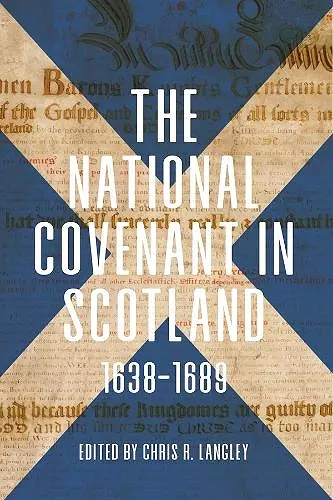The National Covenant in Scotland, 1638-1689
Format:Hardback
Publisher:Boydell & Brewer Ltd
Published:19th Jun '20
Currently unavailable, and unfortunately no date known when it will be back

What did it mean to be a Covenanter? From its first subscription in 1638, the National Covenant was an aspect of life that communities across Scotland encountered on a daily basis. However, how contemporaries understood its significance remains unclear. This edited collection assesses how people interacted with the National Covenant's infamously ambiguous text, the political and religious changes that it provoked, and the legacy that it left behind. This volume contains eleven chapters divided between three themes that reveal the complex processes behind Covenanting: the act of swearing and subscribing the Covenants; the process of self fashioning and identity formation, and, finally, the various acts of remembering and memorialising the history of the National Covenant. The collection reveals different narratives of what it meant to be a Covenanter rather than one, uniform, and unchanging idea. The National Covenant forced contortions in Scottish identities, memories, and attitudes and remained susceptible to changes in the political context. Its impact was dependent upon individual circumstances. The volume's chapters contend that domestic understanding of the National Covenant was far more nuanced, and the conversations very different, from those occurring in a wider British or Irish context. Those who we now call 'Covenanters' were guided by very different expectations and understandings of what the Covenant represented. The rules that governed this interplay were based on local circumstances and long-standing pressures that could be fuelled by short-term expediency. Above all, the nature of Covenanting was volatile. Chapters in this volume are based on extensive archival research of local material that provide a view into the complex, and often highly personalised, ways people understood the act or memory of Covenanting. The chapters explore the religious, political, and social responses to the National Covenant through its creation in 1638, the Cromwellian invasion of 1650 and the Restoration of monarchy in 1660.
[this] is an invaluable contribution to Scottish historiography and will be essential reading for all who wish to study Scotland the seventeenth century, the Scottish reformation, or the Scottish context of the Wars of the Three Kingdoms. -- SCOTTISH HISTORICAL REVIEW
A remarkably comprehensive survey of the state of current scholarship on a fast-growing field of study by eleven new and seasoned scholars of early modern Scotland [and a] wonderfully cohesive collection. * JOURNAL OF THE NORTHERN RENAISSANCE *
[An] amazingly in-depth study -- JOURNAL OF RELIGIOUS HISTORY
Wide-ranging and well-focused -- JOURNAL OF SCOTTISH HISTORICAL STUDIES
This much-needed volume ultimately overturns and reconsiders long-standing stereotypes about Covenanted Scotland by demonstrating the highly fractious and contested (rather than cohesive) nature of the movement. . . . [E]ssential reading for scholars looking for new, cutting-edge approaches to religious and political diversity in early modern Scotland. * STUDIA CELTICA FENNICA *
Insightful and thought provoking. * HISTORY *
The National Covenant in Scotland effectively rebukes previous scholarship that treated Scotland as a sidebar when discussing one of the most significant events in the kingdom's own early modern history. [...] Langley and his contributors have paved the way for future scholars to continue to unearth the uniquely Scottish experiences of the seventeenth century. -- Elizabeth Tapscott * Journal for Eighteenth-Century Studies and Renaissance Quarterly *
The size of the book allows the development of particular themes in a way that a more structural history of 'social gospel' tendencies would not. -- David Thompson * Modern Believing *
ISBN: 9781783275304
Dimensions: unknown
Weight: 502g
264 pages